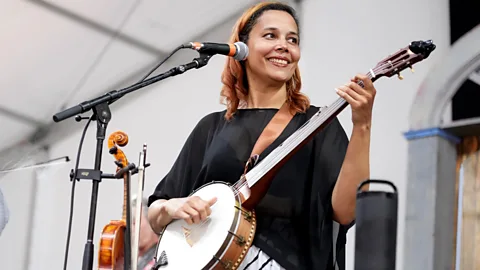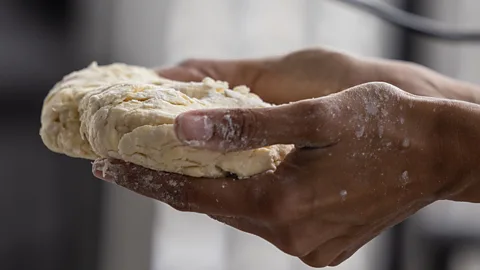Womp, womp, womp.” That’s the sound, according to Grammy Award- and Pulitzer Prize-winning musician Rhiannon Giddens, of a sharp-rimmed glass cutting into just-right biscuit dough. Coming from Giddens’ mouth, the timbre translates as a low note plucked from a double bass.
Giddens is an American scholar-musician whose folk, country and blues music illuminates the African lineage of the banjo and celebrates the legacy of the Black string band. But in 2020, at the outset of pandemic lockdowns, Giddens found herself craving something seemingly less academic: biscuits. Not the crisp British variety that Americans call “cookies” and “crackers”. Not crumbly, sweetened scones – those she could buy in abundance in her adopted city of Limerick, Ireland. No, what Giddens wanted were flaky, buttery biscuits with a definitive rise, the kind that are ubiquitous across the American South.
Five years later, after tweaking her formula and method, Giddens has landed on what she believes is a near-perfect biscuit recipe. Her pandemic baking obsession even inspired her new Biscuits & Banjos music festival, which showcases the similarly winding journeys of Black music and food.
 Getty Images
Getty ImagesDuring the pandemic, Giddens was collaborating with Italian musician Francesco Turrisi on the album They’re Calling Me Home. “Francesco and I were thinking about the food that we couldn’t get because we couldn’t go home,” said Giddens, who grew up in Greensboro, North Carolina. “For me, that turned into, ‘How do I make biscuits?'”
Living in Ireland, Giddens had to rework basic elements of biscuit composition. How would Irish butter, with its higher fat content, impact the texture and rise? Which European flour would yield a comparable crumb? That’s to say nothing of technique. “It turned into an obsession pretty quickly,” she said.
World’s Table
BBC.com’s World’s Table “smashes the kitchen ceiling” by changing the way the world thinks about food, through the past, present and future.
Giddens practiced until she arrived at a flawless variation with an adapted recipe from Southern Living magazine. First, she grates frozen Kerrygold butter into frozen, sifted White Lily flour (the colder the ingredients, the better). Next, she pours in thick buttermilk, and after a cursory stir, she dumps the wet mixture onto a heavily floured counter. “I start folding, turn, fold, turn, fold, turn, pat it out. I don’t bother with a rolling pin,” said Giddens. “I was doing four sets of folds, and then I threw in an extra one. The biscuits went poof.”
Then comes cutting the dough – the womp – before she places the biscuits cheek-to-cheek on pre-cut parchment paper. Meanwhile, there’s a sheet pan heating in the oven at 475F, a critical step that yields crispy bottoms. At first, Giddens confessed, she often underbaked her dough. Now, she checks how done it is after 12 to 15 minutes by gently pressing her fingers on top and jiggling a nascent biscuit; too much movement signals a gummy centre.
 Karen Cox
Karen CoxGiddens’ ideal biscuit has a certain flakiness. It’s sturdy enough to hold bacon without crumbling, and tender enough to enjoy with jam. During the years it took her to master biscuit making, They’re Calling Me Home won a Grammy Award for best folk album. She also composed and sang libretto in Omar, an opera that earned the Pulitzer Prize, and played banjo and viola on Beyoncé’s hit single, Texas Hold ‘Em. Along the way, she started to see how biscuits integrated into her life’s work of tracing the complex history of music.
“Food and music have similar cultural markers. Like food, music moves with people, and it changes as people move. So, it made sense to connect them,” said Giddens. “Biscuits and banjos happen to be two of my obsessions.”